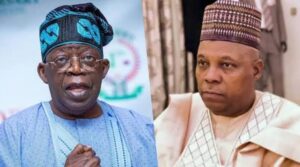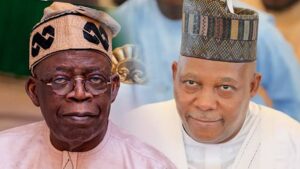Vice President Kashim Shettima has publicly praised President Bola Ahmed Tinubu’s sweeping economic reforms, describing them as bold, necessary, and emblematic of the transformative power of political will—even when the measures are painful. Speaking at the kickoff of the 66th Annual Conference of the Nigerian Economic Society (NES) in Abuja, Shettima emphasized that Tinubu is moving beyond rhetoric, addressing structural weaknesses previous administrations only acknowledged.

Key Insights & Context
1. Political Will vs Lip Service
Shettima stated: “Nigeria is not exempt from Africa’s economic tragedies. But our silver lining is the listening ear of President Bola Tinubu.” He argued that past leaders often paid lip service to reform, but Tinubu is acting—and decisively. “A malignant disease can only be cured by painful surgery. The wounds are temporary, but the recovery is permanent.”
2. Knowledge Economy & Human Capital
Shettima urged African countries to pivot toward knowledge economies—countries must reinvent human capital to harness remote work and digital productivity. His example: “A citizen in Daura can offer services to a company in Dallas without leaving his bedroom.” Structural transformation is the path forward.
3. Facing Global Challenges as Opportunities
Shettima acknowledged current global headwinds—geopolitical conflicts, supply chain shocks, energy transitions, AI—but reframed them as opportunities in disguise, calling on the NES to lead in charting solutions.
4. Targeting Inequality through Infrastructure and Social Safety Nets
Shettima noted that reforms bear inflationary costs, but Tinubu’s government is pushing investment-friendly policies and social protection programmes in transportation, healthcare, and education to shield the vulnerable and promote equity.

“Reforms are never painless, but true leadership is judged by the courage to act when delay would only worsen the crisis. President Tinubu has chosen the harder path of restructuring rather than the easier route of postponement, and history will remember that.” — Princess G. Fraser, MFR, National Patriots; Perception Management & Governance Consultant.
Broader Context: Reform Track Record & Vision
Fuel subsidy removal (May 2023): Tinubu scrapped the costly fuel subsidy, saving the government an estimated $5.1 billion annually, according to the World Bank. This spurred inflation but signaled serious fiscal restructuring.
Institutional shakeup: He suspended the then-Central Bank Governor in June 2023 and lifted FX restrictions, triggering a historic devaluation of the naira—moves seen as dismantling distortions in monetary policy.
Agriculture pact with Brazil (June 2025): A $1 billion cooperation deal to mechanize farming, improve food security, and bolster energy sectors, aligning with Tinubu’s ambition to build a $1 trillion economy by 2030. Shettima cited this as evidence of reform-driven investment.
Analysis: Risks, Rewards & Nigeria’s Path Forward
Dimension Opportunity Risk
Economic restructuring Strong fiscal direction and investor confidence Painful short-term hardships—e.g., rising inflation and living costs
Human capital dev’t Knowledge economy invites youth participation and global integration Needs rapid skills training and digital infrastructure
Inclusivity Directing reforms toward marginalized groups fosters social cohesion Potential backlash if safety nets fall short
External shocks Viewing global challenges as chances for innovation and adaptation Vulnerability to geopolitics, commodity shifts, and supply chain shifts
Conclusion
At the NES conference, VP Kashim Shettima underscored that Tinubu’s reforms mark a turning point—embracing structural change, not lip service. From subsidy removal to institutional reforms and international partnerships, the government is reshaping the nation’s economic foundation. Yet, success hinges on managing inflation, building human capacity, and safeguarding the vulnerable.
If executed well, the “painful surgery” may well yield lasting economic recovery and transformation.

Princess G. Fraser, MFR of the National Patriots and a seasoned Perception Management & Governance Consultant, noted that Shettima’s defense of Tinubu’s reforms reflects an important truth: “Every nation that has broken free from economic stagnation did so by enduring short-term pain for long-term stability. Nigeria cannot be different. The critical task now is not whether reforms are necessary—they are—but how well government can cushion vulnerable groups, communicate progress transparently, and keep citizens engaged in the journey.”
Princess G. Fraser. MFR
The National Patriots.
Headlinenews.news Special publication.




